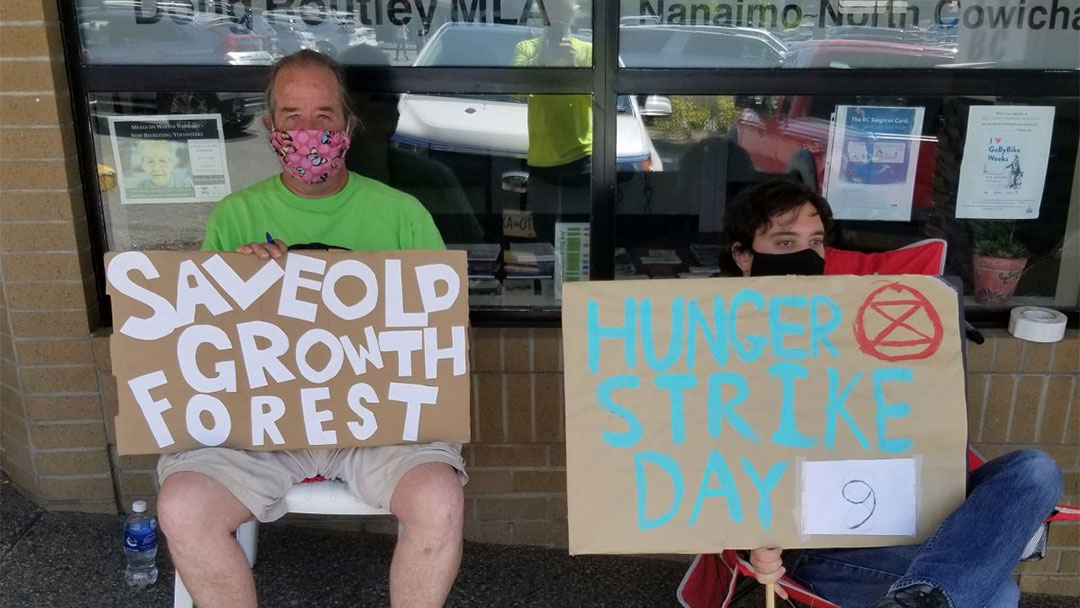We are reprinting this story from today’s National Observer. Like the hunger strikers, we want old growth protection, NOT “sustainable” logging of them.
Environment minister says he shares concerns of B.C. hunger strikers
By Carl Meyer | News, Politics, Federal policy for B.C. | August 5th 2020
Two people are on a hunger strike on Vancouver Island, demanding an end to logging of old-growth forests in B.C., and Canada’s federal environment minister says he shares their concerns over biodiversity loss.
During a media teleconference Tuesday, National Observer asked federal Environment and Climate Change Minister Jonathan Wilkinson about James Darling and Robert Fuller, who are on their ninth day of no food, protesting in front of the office of Nanaimo-North Cowichan MLA Doug Routley.
Darling and Fuller, who are representing Extinction Rebellion, have written a letter to B.C. Premier John Horgan saying they won’t eat until he implements a ban on old-growth logging.
“I think the topic that they’re trying to raise, certainly old growth is one element of it, but it’s around sustainable forestry practices … I would share their concerns with respect to ensuring that we are thinking about forestry in a sustainable lens, on a go-forward basis,” Wilkinson said.
“Certainly I have a lot of sympathy for trying to ensure that we can continue to extract value from our forest resources, but do so in a matter that is not continuing the decline in biodiversity that we’ve seen over the past couple of decades.”
In an interview following the minister’s comments, Darling said he didn’t know what Wilkinson meant when he described their cause as being based around sustainable forestry practices.
“It’s not like old-growth is renewable. It takes thousands of years for old-growth forests to develop (ecosystems). Just the trees themselves are hundreds of years old. So once it’s logged, it’s gone,” Darling said. “I’m not really sure what he means by sustainable. It’s inherently unsustainable, logging old-growth.”
Wilkinson was speaking to media after announcing a $2 million expenditure over four years for Kootenay Connect, a program meant to help “protect and restore species-at-risk habitat and ecological connectivity in four biodiversity hotspots in the Kootenay region.”
The minister said the funding would help conserve habitat for 28 species at risk, including grizzly bears and northern leopard frogs, in the four regions of “Bonanza Biodiversity Corridor, Creston Valley, Wycliffe Wildlife Corridor, and the Columbia Valley Wetlands.”
‘Politicians are really good at saying the right things’
The two hunger strikers have pointed to findings by the University of Victoria that say habitat loss is the main threat to B.C.’s at-risk species, and habitat destruction and degradation threatens a vast majority of the species at risk in the province.
Two people are on a hunger strike on Vancouver Island, demanding an end to old-growth logging, and Canada’s environment minister says he shares their concerns over biodiversity loss. But one striker made it clear they don’t see eye-to-eye.
Darling said he was inspired to take a stand after reading about an independent scientific report released in June that showed that there is little left of the province’s old-growth forests containing tall trees, and only a small portion of that is being protected from logging.
The provincial government, which has launched a review of old-growth forest management, says old-growth forests make up about 23 per cent of forested areas, with “mature forests,” meaning “largely natural” and generally greater than 80 years old in the interior, are about 46 per cent of the forested area.
But the report, “B.C.’s Old-Growth Forest: A Last Stand for Biodiversity,” said those numbers obscure reality. The scientists found that only about three per cent of forests with very large, old trees still remain, and only about eight per cent of the original extent of intact forests with old trees remain as old-growth forests.
“This current status puts biodiversity, ecological integrity and resilience at high risk today,” the report stated. Last year, the United Nations put the spotlight on biodiversity, warning that nature is more vulnerable than at any point in human history, with the activity of humans threatening the extinction of over a million species of plants and animals.
“In general, I feel that politicians are really good at saying the right things and expressing their concerns for the environment, and saying they want to protect species. But we’re living, globally, in a mass extinction event that’s driven by human activity,” Darling said.
“I just think that destroying what remains of our old-growth forests is just totally insane. Humans are animals too, and to think that we’re not going to be affected is wishful thinking.”
Wilkinson said Tuesday that, through both his current and prior government work, he had become very familiar with the issue of protected spaces that can allow for the continued functioning of key species such as caribou. He said the announcement Tuesday for Kootenay Connect “is actually about that — it’s about connectivity and about habitat restoration.”
The hunger strikers have received a positive reaction so far from the community, Darling said. He said he plans on continuing his protest for the time being. “At some point I’m going to have to stop, but for now I’m going to keep going.”

